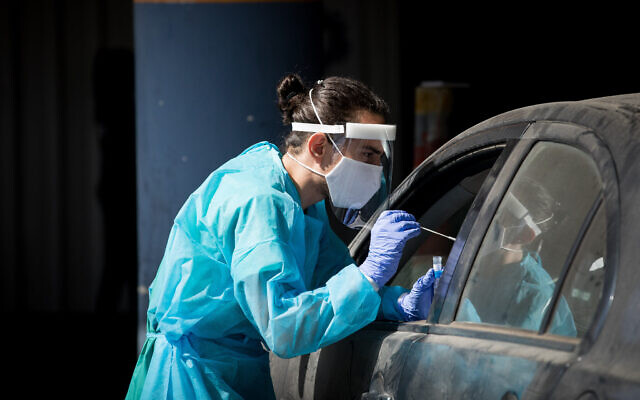Prime Minister Benjamin Netanyahu on Sunday resisted pressure from his colleagues to ease virus restrictions, saying he would wait until at least 10 days of full lockdown to reassess the situation.
Cabinet ministers are set to debate the next stage of the coronavirus lockdown, with many top officials calling for easing the restrictions as the infection rate appears to stabilize. However, the key seriously ill figure continues to climb, reaching 900 on Sunday night.
Health officials have expressed “cautious optimism” in recent days that the curve of infection has begun to flatten, following several days of declining numbers of daily confirmed carriers and a drop in the “positivity rate,” the percentage of virus tests that return positive.
Finance Minister Israel Katz, Economy Minister Amir Peretz and Science Minister Izhar Shai reportedly all support reopening many businesses, as well as permitting preschools to open so that parents of small children are able to go to work.
In a video released on social media on Sunday, Netanyahu pushed back against the pressure to reopen quickly.
No decision on lifting restrictions would be made until 10 full days of lockdown had passed, Netanyahu said, meaning that the next cabinet vote on changing the lockdown rules will take place only on Thursday.

Prime Minister Benjamin Netanyahu in a video calling on Israelis to obey coronavirus lockdown rules, October 4, 2020. (Twitter screen capture)
“There are those who already say they have ‘cautious optimism’ that the lockdown is starting to work, to flatten the curve,” Netanyahu said in the video.
“I’m more cautious than the cautious. I want to wait at least until 10 days have passed, at least 10 days. That means that decisions on continuing the lockdown after Simchat Torah [which ends October 10 in the evening] will only be made on Thursday.”
He added: “In the meantime, we’re going to discuss in the cabinet tomorrow the [infection] figures for a long-term exit, for moving from stage to stage, protecting the vulnerable populations, and increasing the fines, discipline, and enforcement.”
Last week, Netanyahu said the lockdown would last at least a month, and many of its restrictions could be in place for as long as a year.
Health Ministry officials are urging the government not to lift the lockdown measures until the infection rate has dropped dramatically.

A synagogue in Bnei Brak, closed down by police on October 1, after a large congregation was found gathered there in violation of coronavirus rules. (courtesy, Israel Police)
Last week, health officials told the Knesset that the lockdown would have to remain in place until the number of daily confirmed carriers drops below 2,000 and the positivity rate goes under 7%.
The number of confirmed carriers has been declining for five days, from an all-time high of 9,015 on Wednesday, to 7,024 on Friday, 2,576 on Saturday, and just 1,964 for Sunday, according to Health Ministry figures.
The steep decline could be a blip linked to reduced weekend testing — especially since the Haredi population, where the virus is spreading the fastest — does not get tested over the Sabbath. But officials have noted that reduced numbers of tests usually raises the positivity rate, while the positivity rate in recent days has been declining. That suggests the dramatic lockdown imposed last week nationwide may be tamping down infections.
According to a Sunday report released by the National Security Council, the positivity rate has dropped from a four-day average of 13.7% for September 26 through 29, to an average of just 11.5% for September 30 through October 3, with the final day, despite its reduced number of tests, showing just 10.3% positive.
While new infections appear to be declining, officials said, the number of seriously ill, which trails new infections by at least a week, is continuing to rise, growing from 810 on Thursday to 900 on Sunday.
Israel had set 800 as the number of seriously ill that that would begin to overwhelm hospitals.

Medical team member takes a swab from a woman to test for the coronavirus disease at Shaare Zedek hospital in Jerusalem on September 30, 2020. (Nati Shohat/Flash90)
According to the Kan public broadcaster, the official leading the charge against lifting restrictions is the government’s coronavirus czar Ronni Gamzu, who is expected to recommend to the cabinet that elementary schools and Haredi yeshivas remain closed at least for the coming month — and not until October 19 under the current lockdown plan.
Finance Minister Katz announced Sunday that he would recommend to the cabinet that “50 percent” of the economy be opened within a week, especially those businesses that have 10 or fewer employees or that have no walk-in customers.
Businesses in those categories have not been identified as significant sources of coronavirus infection, treasury officials have argued, while their reopening will dramatically reduce the economic pain of the lockdown.
Katz is calling to lift the restrictions on such businesses beginning Sunday.
Transportation Minister Miri Regev is expected to urge ministers to allow commercial air travel to resume beginning October 14, even if the remaining lockdown restrictions remain in place, but with a 10-day quarantine requirement for those arriving from “red” countries, those with high infection rate. Incoming business travel should be allowed from November, Regev will say, according to Hebrew media reports.

Finance Minister Israel Katz holds a press conference at the Finance Ministry in Jerusalem on July 1, 2020. (Olivier Fitoussi/Flash90)
The Blue and White party is also calling for partially reopening the economy, according to Channel 13, and is reportedly planning to present an exit strategy from the lockdown to the cabinet.
A meeting on Sunday between National Security Council head Meir Ben-Shabbat and Health Minister Yuli Edelstein, as well as top Health Ministry officials, ended with the recommendation to Netanyahu against a reopening, saying there was not yet enough reliable data to trust that the decline in morbidity was stable.
Economy Minister Peretz said Monday’s cabinet meeting would seek to set “a formula that determines the scale of reopening based on the decline in infections.
“We must act carefully…but the financial situation of small business owners is one of borderline collapse, we have to find ways to let them get back to work.”
Meanwhile, the National Security Council is expected to present a new report, released Sunday, that called to dramatically increase fines for rule-breakers.
As of Sunday evening, the latest Health Ministry figures said that 266,775 Israelis had been confirmed as carriers since the start of the pandemic, 900 were now hospitalized in serious condition, 215 of them on ventilators, and 1,719 had died from the disease.
 RSS Feed
RSS Feed















 October 5th, 2020
October 5th, 2020  Awake Goy
Awake Goy  Posted in
Posted in  Tags:
Tags: 













